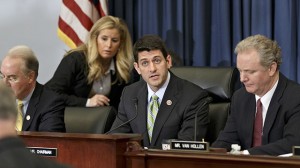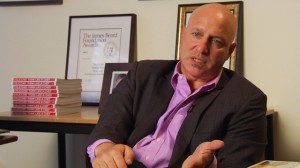This post is cross-posted on TalkPoverty.org, a new blog launched today by former Moyers & Company guest, Greg Kaufmann.
I’m a chef, a food activist, an avid eater and a healthy-cooking parent, though most people know me from my role as head judge on Bravo’s Top Chef. All of the above warrant my inclusion in what is known as the food movement.So you may be surprised to learn that lately I’ve been asking myself this question: Is there actually a food movement?
Twenty-five years ago, as a fledgling chef, I didn’t ask these sorts of questions. I started purchasing fresh food for my restaurant from farmer’s markets because it tasted better. Back then I could actually back my truck up into the market at Union Square and load up on root vegetables and fresh herbs from Guy Jones and the other early farmers who sold vegetables there. I was buying local and organic — not because I was concerned about the environment or farm workers — but because it simply tasted better and my goal at the time was to be the best chef I could be. It was higher quality food, period.
Around the same time, I was invited to cook at a Share Our Strength Taste of the Nation fundraiser. I was happy to support SOS’s mission to combat hunger, but frankly, I agreed because it meant I was invited to cook alongside the country’s most elite chefs that night, and I was flattered to be included.
Around this time I started to feel uneasy about the great schism between the variety and quality of what I could offer my guests at restaurants, and the food available to millions of other Americans for whom a meal at Craft or Colicchio & Sons was not an option. As a chef, it’s my job to feed people, and given my own humble roots, it didn’t feel right to only feed the luckiest few. That was the impulse behind ‘wichcraft – I wanted to offer great, high quality food at a more democratic price point. But that wasn’t enough to quiet my growing discomfort. A $10 artisanal sandwich wasn’t the answer to unequal food access.
Over the years I continued to cook for any group that was tackling hunger. I saw my role as a fundraiser, plain and simple. When asked, I also lent my voice to groups who were pushing for more sustainable ways of farming the land, and to environmental groups bent on protecting our food and fisheries.
Then, about six years ago, my wife Lori began working on a movie that examined our nation’s hunger crisis. She was determined to ask some hard questions about how the world’s wealthiest nation could have a massive hunger crisis — a crisis virtually unknown in other wealthy, developed nations.
To put it in perspective: The most successful fundraising gala I’ve ever attended raised $2 million dollars to support the food banks of New York City. Earlier this year, Congress voted to slash $8.8 BILLION dollars from SNAP. To make up for $8.8 billion dollars in cuts to food for hungry people, we would need to replicate the success of that fundraiser every single night. For the next 12 years.
The truth is that the great work of charities is being undermined by really bad policy, and until we face that truth, we’re deluding ourselves. If bad policies — like cruel cuts to food stamps or a minimum wage so low that working people can’t afford food — are creating the problem, then it will take good policies to fix them. And where do policies get written, decided and voted on? Washington, DC.
Marion Nestle once described a meeting she had on Capitol Hill where she used the term “the food movement.” The congressman chuckled and said, “The food movement? What food movement?” As he saw it there was no food movement because Congress wasn’t hearing from them and they weren’t voting people in and out of office on the basis of these values.
Plain and simple, his point was: you might think you’re a movement, but if you’re not getting anyone elected, then your issues don’t matter here. Sorry.
So far, the food movement has been no match for the food industry, especially on Election Day. That’s why so many of our food policies benefit industrial agriculture and giant food processors at the expense of struggling families.
Unfortunately, the Americans most affected by policies that lead to hunger haven’t been able to move the needle on influencing our leaders for obvious reasons — when you’re struggling just to get enough food together for your kids each day, you’re unlikely to be able to focus on organizing a political movement.
For years now, food advocates and hunger advocates have been in silos — so focused on making modest gains that many times we are faced with bargaining between good food policy and reducing hunger.
The key to our success is impossible to ignore — we have to get out of our silos and work together as a political movement. When that starts to happen, we won’t be in the kind of situation we were in during this last Farm Bill debate, which split people who care about hunger from people who care about healthy diets and organic farmers. We all share the same food values, but we were too divided to deliver the food system Americans overwhelmingly want.
That’s why I worked with food leaders from across the country to help create Food Policy Action. Finally, we are uniting food leaders from across the country, and are holding legislators accountable. We can see whether or not they share our values. Because that’s what this is about. This is about creating a system that works for everyone. It’s about more than just food: it’s about justice.
Every year, Food Policy Action issues a scorecard that tracks how legislators are voting on the issues we all care about, issues like hunger, nutrition, food access, food and farm workers, food safety, local food and farming, animal welfare and reforming farm subsidies.

House Budget Committee Chairman Rep. Paul Ryan (R-WI) center, presides over a markup session where House Republicans are crafting a budget-balancing plan that sharply cuts spending on food stamps and other domestic initiatives, on April 2, 2014 in Washington, DC. (AP Photo/J. Scott Applewhite)
Now is the time for us to band together with people working on all food issues to make food matter in elections. We can work together to introduce tax incentives that promote the right kind of behavior from industry. We can raise Americans’ awareness of how their leaders are voting on issues that directly impact the quality and availability of their food. We can call out our leaders who show disdain for American eaters by voting for bad food policies and force them to defend those votes in primaries, talk to SNAP recipients, and stare down the 17 million kids who routinely go hungry through no fault of their own. We can start to vote for good food not with our dollars, but with our votes.
As soon as one legislator loses their job over the way they vote on food issues, it will send a clear message to Congress: We are organized. We’re strong. Yes, we have a food movement, and it’s coming for you.
Join me, #VOTEFOOD.



